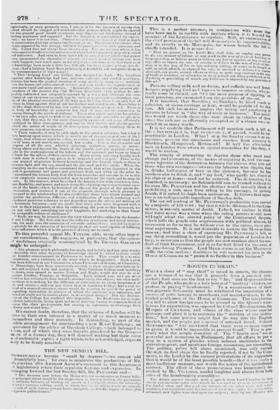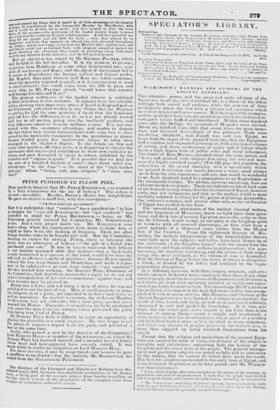" ROGUES IN GRAIN."
WDEN a shout of " stop thief" is raised in streets, the chances are a thousatal to one that it proceeds from a pursued pick- pocket : frail ones are the that to cry " fie; " and Representatives
t lie People, who profess a holy horror of " treating " clators, are profuse in paying " head-money." To a consciousness of their own gigantic dishonesty must be attributed the imputation of a species of petty larceny to merchants and manufacturers, by the landed gentlemen of the House olComtnons. The introduction Of a bill to allow foreign corn to be ground in the Queen's ware- houses for exportation, was opposed by Colonel Rustinitoolts, the M trquis of CH.tNDOS, and others of the class whose especial province and glory it is to maintain the " stability of' our institu- tions," lest some portion might find its way into the English indrket, and the people get a morsel of untaxed bread. Colonel RusiontooKE " was convinced that there were so many rogues in grain, it would be impossible to prevent fraud." This is pre- cisely what the people complain of The " family men" are so peverful and numerous in Parliament, that all efforts to put a stop to a system of plunder which reduces multitudes to the starvation-point, and paralyzes foreign commerce, are unavailing. The pedling, paltry bill above mentioned, was only carried thri.uAll its first stage (to be finally rejected, if not by the Coms mons, in the Lords) by the earliest protestations of its supporters that it would be of the least possible benefit—that it was really a most inefficient measure, not worth the notice of the agricultural interest. The effect of these protestations was humorously de- scribed by Mr. VILLIERS, amidst laughter and cheers from both sides of the humbugging; assembly— The debate opened tosuight with a speech from Lord Chiunmhmu. ma that sturdy and exclusive spirit wall wItieli he was used to ;elem. it [wrest, of the landed class, and iiisn.g oh the interest of :lay other di—, awl wInel doubtless was consistent with his notions of what was i•ight ; hot es the debac advanced, new lights were shed upon the sithject ; first, by one Member who {VOUld be Of link use to trade ; and that seemed to alter the view latietillof the nwasure—the gentlemen of the landed interest began to pause tian-a—think that this could not be such i a had measure. A hill thnt provided no. hi for the people, amt glid little for trade — why, that cannot be so tifs-angernus: and from that 'unguent an altered tone was observed throughout thel4debate; and he was happy to see that one Member after another row, and
id that he could not understand how, with adequate securities against the
st obtaining the advantage they sought in procuring cheap food, there could be any objection to the measure ; and the bill gained ground. But an objection was stated by Mr. GEORGE PALMER, Whieh will be fatal to the bill hereafter. It is tne practice at present, to procure from Hamburg or some other Continental port, sup- plies of sea.bistent and flour ; and the object of the present bill is to secure to Entaliehmen the foreign millers' and bakers' profits. y But English dte -paid biscuits and flour arc taken sometimes hen the quantity required is small, or it is inconvenient to send to the Continent : this would cease were the bill to pass, and every ship, as Mr. PALMER stated, " would leave this country with foreign biscuits and flour." The griping selfisheese of the landed interest is exhibited in their resistance to this measure. It appears from the valuable tables, showing the compa alive prices of bread in England and on the Continent. published weekly in the Times. that the Parisian is getting for 51d. the sam2 quantity of bread that the Londoner pays ad. for—the differeece, in so far as it is not utterly wasted and lost to all parties, going into the landlords' pockets; and that difference amounts to some millions a year. Yet, not con- tented with this enormous advantage, and unable to dispute the fact that a very serious inconvenience with some loss is occa- sioned to the mercantile community by the prohibition to manu- facture bonded grain, the landowners refuse to relax their monopoly in the slightest degree. In the debate on this and every other question air (ging rents, it is disgusting to observe the systematic and sine le-eyed attachment to their own exclusive in- 1 terest, and open disregard of eljury to others, exhibited by the confederated " rogues in grain." Is it possible that we may lose the sale of a hundred bushels of corn ?—then throw other con- siderations "to the thugs "—is the shout of the " highenarket patriots," whose " being, end, aim, religion," is "rent, rent, tent!" toe and assured the House that it would be of little advantage to the country It me he was followed by the honourable Member for Manchester, who



























 Previous page
Previous page